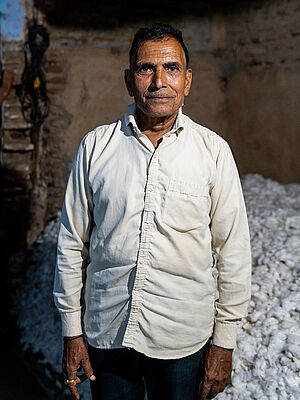Surendra Singh Mandloi, Farmer
"The plan has been all laid out. Everything set for the next research season. The research that is done there always also includes us farmers in the region. So one day right before the trials would start they came to talk to me. And what I told them about my recent experience made them change their plan all over.
They have been looking for new ways to supply the cotton plant with the nutrients it needs. Which is not an easy thing in organic agriculture. In organic agriculture you feed the soil and the soil feeds your plants, it’s the natural way. But some nutrients can get stuck in the soil. They are there, but the plant can't reach them. Especially difficult can be phosphorus. It is one of the key nutrients, and back then you could really see that the cotton bolls of organic farmers were meagre because of the lack of phosphorus.
I had been worrying about these meager bolls in my fields, as well. So one time when I added some phosphorus to my soil I mixed it beforehand with buttermilk. And it turned out that my plants were looking much better. And so when the head of research from FiBL got to learn my experience he grew curious; He said I could be on to something. The researchers set up a new trial plan for this season. I learned that the acid parts of the buttermilk were responsible for the effect that I had observed on my fields. The acid can dissolve some of the phosphorus in the soil so that the plants can reach it easily. It seemed to work, but the scientists wanted to make absolutely sure. So there were experiments running for some years on different farmers’ fields to test the idea under a variety of conditions. Until the scientists and us farmers were sure.
My initial idea was right; the researchers have proven and refined it to make it work for all organic farmers in our region. Most of the farmers here have buttermilk available as everyone has some cows and produces their own milk, yoghurt, or buttermilk. But you can also use vinegar, for example. It’s important to develop solutions with local ingredients so that farmers can make it themselves instead of paying a lot of money for synthetic inputs.
But there remain challenges for the farmers in our region. That was why I told my son when he studied agriculture that he should use his knowledge to help us farmers to find solutions to these problems. And I am glad he did. Just like I had followed my father’s advice after my studies to become a farmer and to serve the people by creating jobs and opportunities for those in need. Because we need to take care of things. We need to take care of our fellow human beings and of mother nature."
Surendra Singh Mandloi is 65 years old and lives in Amlatha. His phosphorus processing technique was scientifically published by his son, Lokendra Singh Mandloi, and FiBL researchers. He has been participating in the SysCom on-farm research since 2013 and is a member of the farmer advisory committee. He has been a registered organic cotton farmer with Remei India Ltd since 1993.
More portraits and link
- fibl.org: Faces of Organic Cotton
- mdpi.com: Article "Partial Acidulation of Rock Phosphate for Increased Productivity in Organic and Smallholder Farming"





